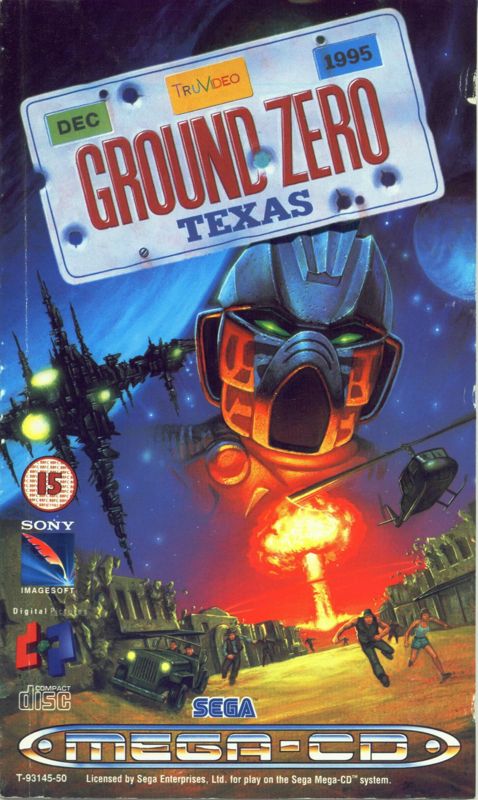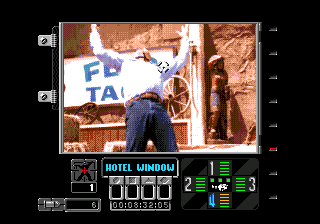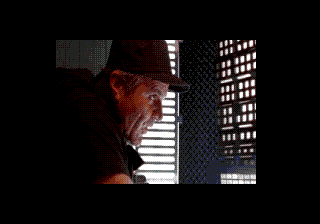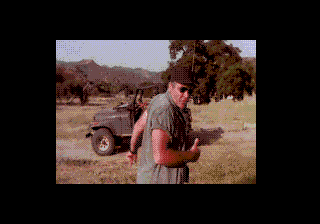Retro Replay Review
Gameplay
Ground Zero Texas delivers a distinctive blend of surveillance strategy and quick-draw shooting that keeps players on edge throughout each mission. From the moment you begin monitoring the four camera feeds, you are tasked with balancing vigilance and reaction time. Indicators alert you to critical events, forcing you to switch feeds instantly—miss one, and you might witness a citizen’s abduction or an agent under attack.
(HEY YOU!! We hope you enjoy! We try not to run ads. So basically, this is a very expensive hobby running this site. Please consider joining us for updates, forums, and more. Network w/ us to make some cash or friends while retro gaming, and you can win some free retro games for posting. Okay, carry on 👍)
Once you select the flashing feed, the game plunges you into a single-screen shooting gallery, where timing and accuracy are paramount. Alien intruders emerge suddenly, and you must leverage your custom-built gun camera to fend them off. With each successful shot, you safeguard the town’s residents and preserve the camera’s operability. Let your guard down, however, and the camera’s feed begins to degrade, adding a tangible sense of urgency to every encounter.
Multitasking is the heart of the gameplay loop. As threats escalate, you’ll find yourself juggling between feeds more frequently, responding to overlapping alarms and managing camera health. This delicate balancing act can be overwhelmingly satisfying when executed well, though the pressure can feel intense for players unaccustomed to split-second decisions. The game’s pacing ensures that adrenaline spikes become routine, making each session a high-stakes exercise in resource management and reflex testing.
In its later stages, Ground Zero Texas ramps up the challenge by introducing tougher enemies and quicker event triggers. While the core mechanic remains consistent—monitor, switch, and shoot—the increased frequency of attacks and faster-moving targets demand sharper focus and quicker responses. This progression keeps the gameplay loop fresh, ensuring that even veteran players face new hurdles as the alien invasion tightens its grip on the town.
Graphics
Visually, Ground Zero Texas leans heavily into its full-motion video roots, combining live-action sequences with interactive overlays. The pre-rendered clips showcase real actors and practical sets that evoke a late-’90s sci-fi thriller atmosphere. Though the resolution and frame rate may feel dated by modern standards, there’s a nostalgic charm in seeing familiar townsfolk and droning creatures brought to life on screen.
The four camera feeds are cleverly designed to loop ambient activity until an alert triggers a critical event. This looping technique cleverly masks the game’s limited video assets while creating a sense of normalcy punctuated by sudden horror. Each feed’s damage effects—static, color distortion, and flicker—add tension, making you feel as though the hardware itself is under siege.
Special attention is given to the transition animations when you switch cameras or enter a shooting sequence. These bursts of static and visual noise heighten immersion, reinforcing the idea that the entire system is fragile. While the graphics don’t push the boundaries of modern hardware, the deliberate use of visual artifacts and grain gives the game a distinct identity that suits its covert surveillance premise.
Character designs, from innocent bystanders to sinister Pod People, strike a pleasing balance between believable and uncanny. Close-up shots of abducted citizens reveal subtle twitching and unnatural movements, driving home the horror of alien possession. Although polygon counts remain low and textures simple, the game’s visual design successfully sustains a mood of creeping dread across every feed.
Story
Ground Zero Texas unfolds against the backdrop of a sleepy border town under extraterrestrial assault. The central narrative hook—aliens abducting locals and replacing them with drone-like impostors—plays out through the segmented camera feeds. Each clip reveals snippets of civilian life, only to be shattered by sudden terror, giving the story a fractured, voyeuristic structure.
As the lone technician behind the console, you piece together the invasion’s scope by catching key moments on camera. Dialogue is sparse but impactful, with radio chatter and on-screen cues filling in the gaps. The tension arises less from elaborate cutscenes and more from real-time stakes; every missed alarm feels like a narrative failure, and every saved civilian feels like a hard-won triumph.
The twist that a rescued citizen might later reappear as an alien infiltrator adds depth to the story’s paranoia. It keeps you second-guessing your previous decisions, wondering if someone you couldn’t save has returned to haunt the town under a familiar face. This narrative device underscores the game’s theme of mistrust and infiltration—no one is safe, and the enemy might already be among you.
While the plot doesn’t offer branching paths or multiple endings, the intensity of the unfolding invasion and the gradual increase in stakes provide a compelling arc. By the time the final waves of aliens roar onto the screens, you’re deeply invested in the town’s fate, rooting for every citizen you manage to protect and bracing for those you cannot.
Overall Experience
Ground Zero Texas stands out as a niche title that marries surveillance strategy with arcade-style shooting. Its unique camera-switching mechanic offers a fresh twist on interactive FMV games, providing a challenging multitasking experience that few titles replicate. The thrill of salvaging a damaged feed just before it blacks out creates moments of genuine triumph and tension.
The game’s retro FMV aesthetic may divide modern players: enthusiasts of vintage interactive cinema will appreciate its stylized grain and practical effects, while purists seeking high-fidelity visuals might find it lacking. However, the visual and audio design work in tandem to sustain a constant sense of unease, making the modest production values feel like a deliberate artistic choice.
Ground Zero Texas rewards focus and quick thinking, though newcomers to FMV games may face a steep learning curve. The absence of traditional save points and the relentless progression can be unforgiving for casual players. That said, mastering the delicate art of feed management and marksmanship yields a satisfying sense of control over the unfolding alien threat.
For anyone intrigued by conspiracy thrillers, border-town mysteries, or adrenaline-pumping defensive scenarios, Ground Zero Texas offers a compelling ride. Its blend of strategy, action, and horror elements creates a memorable package that stands apart from more conventional shooters. If you’re ready to juggle cameras under fire and unravel an alien plot one feed at a time, this game is well worth investigating.
 Retro Replay Retro Replay gaming reviews, news, emulation, geek stuff and more!
Retro Replay Retro Replay gaming reviews, news, emulation, geek stuff and more!









Reviews
There are no reviews yet.